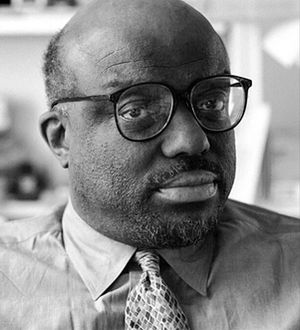Stanley Crouch facts for kids
Quick facts for kids
Stanley Crouch
|
|
|---|---|
 |
|
| Born |
Stanley Lawrence Crouch
December 14, 1945 Los Angeles, California, U.S.
|
| Died | September 16, 2020 (aged 74) New York City, New York, U.S.
|
| Nationality | American |
| Occupation |
|
|
Notable work
|
Don't the Moon Look Lonesome? (2000 novel) |
| Awards | Windham–Campbell Literature Prize (nonfiction), 2016 |
Stanley Lawrence Crouch (born December 14, 1945 – died September 16, 2020) was an American writer. He was a poet, music and culture critic, and novelist. Stanley Crouch was especially known for his writings about jazz music. He also wrote a novel called Don't the Moon Look Lonesome? in 2000.
Contents
Stanley Crouch's Life Story
Early Years and Learning
Stanley Lawrence Crouch was born in Los Angeles, California. His mother, Emma Bea (Ford) Crouch, raised him. From a young age, Stanley loved to read. He read many classic American books before finishing high school. His mother shared stories of her youth in east Texas. She also told him about the black culture of the southern Midwest. This included the lively Kansas City jazz music scene. These stories helped him become very interested in jazz.
Stanley graduated from Thomas Jefferson High School in Los Angeles in 1963. After high school, he went to junior colleges. He also became active in the Civil Rights Movement. He worked with the Student Nonviolent Coordinating Committee. This group worked for equal rights for all people.
Becoming a Poet and Teacher
Stanley Crouch also joined artistic and educational projects. These projects focused on the African-American community in Los Angeles. Soon, people noticed his poetry. In 1968, he became a poet-in-residence at Pitzer College. This meant he was a poet who taught at the college. He then taught theater and literature at Pomona College until 1975.
The Watts riots in Los Angeles were a big event for him. These events made him think deeply about race in America. He wrote poems about these important issues.
Music and Moving to New York
Stanley Crouch was also a jazz drummer. He formed a group called Black Music Infinity with David Murray. In 1975, he moved from California to New York City. He wanted to do more with his music and writing there. He lived with David Murray above a club called the Tin Palace.
He played drums for David Murray and other musicians. He also helped book avant-garde jazz shows at the club. Even though he loved music, he admitted he wasn't the best drummer. He said he was "a real knucklehead" when it came to playing.
New Ideas and Friendships
In New York, Stanley Crouch became friends with Ralph Ellison and Albert Murray. These writers helped him think differently. He started to focus less on race as the only way to see things. He learned that it's important to be free from just one way of thinking. He realized that if you only look at things through race or class, you might miss what's really happening.
In 1979, he publicly changed his views on black nationalist ideas. He wrote for the Village Voice newspaper from 1980 to 1988. He was known for his strong opinions. He often criticized cultural and artistic trends he thought were not good. He became a friend and mentor to Wynton Marsalis, a famous jazz trumpeter. He supported the neotraditionalist movement in jazz. This movement aimed to bring back the original values of jazz. In 1987, he became an artistic consultant for the Jazz at Lincoln Center program.
Writing and Recognition
After working at the Village Voice, Crouch published a book of essays. It was called Notes of a Hanging Judge: Essays and Reviews, 1979–1989. This book was chosen as the best essay collection in 1990. He received several awards for his writing. These included a Whiting Award in 1991. He also got a "genius" grant in 1993.
Stanley Crouch kept writing many books and articles. He wrote columns for the New York Daily News. He also appeared in documentaries and TV discussions. He was a commentator on Ken Burns' Jazz (2001) and Unforgivable Blackness (2005). The latter was about the boxer Jack Johnson. He also wrote a novel, Don't The Moon Look Lonesome? (2000). He published a collection of his jazz writings, Considering Genius (2007). His biography of jazz musician Charlie Parker, Kansas City Lightning, came out in 2013.
Later Life and Passing
Stanley Crouch's health declined in his last ten years. He passed away on September 16, 2020, in New York City. He was 74 years old. He had been ill for a long time. He also had COVID-19 in the spring before he died.
Stanley Crouch's Views
Political Ideas
Stanley Crouch's political thinking changed over time. At first, he was interested in the Black Power movement of the late 1960s. But he later became disappointed with it. He wrote about his changed views in his books. He felt that focusing too much on race could stop people from solving bigger problems. In the 1990s, he called himself a "radical pragmatist." This meant he supported ideas that he believed would work best. He wanted to find solutions that were inspiring and practical.
Criticizing Public Figures
In his newspaper column, Stanley Crouch often shared his strong opinions. He sometimes criticized well-known African Americans. He was critical of people like Alex Haley, who wrote Roots: The Saga of an American Family. He also criticized community leader Al Sharpton and filmmaker Spike Lee.
Views on Music
Crouch was also a strong critic of gangsta rap music. He believed it promoted violence and bad attitudes. He defended Bill Cosby's "Pound Cake Speech" which also criticized rap music. He praised a women's group at Spelman College for speaking out against rap.
He also had strong views on jazz music. He believed some forms of jazz moved away from its true core values. He was called a "rigid jazz purist" by some critics. He did not like avant-garde jazz or jazz fusion. He once said, "We should laugh at those who make artistic claims for fusion."
Robert Boynton wrote in The New Yorker that Crouch loved a good debate. He said Crouch had a unique way of looking at culture. He also noted that Crouch would "fight to prove his points."
Working with Wynton Marsalis and Ken Burns
Wynton Marsalis, a famous trumpeter, called Stanley Crouch his "best friend" and "mentor." They met when Marsalis was 17 and moved to New York City. Crouch wrote notes for Marsalis's music albums.
Crouch was an advisor for Ken Burns's 2001 documentary Jazz. He also appeared a lot in the film. Some jazz fans felt the film focused too much on traditional jazz. This was partly because Marsalis and Crouch were involved.
After Jazz, Crouch appeared in other films by Ken Burns. These included a DVD for The Civil War (2002). He also appeared in Unforgivable Blackness: The Rise and Fall of Jack Johnson (2004).
Awards and Honors
- In 2004, Stanley Crouch was a judge for the PEN/Newman's Own First Amendment Award. This award helps protect freedom of speech in writing.
- In 2005, he became one of the first fellows of the Fletcher Foundation. This foundation gives awards to people working on race and civil rights issues.
- In 2005, the Police Benevolent Association of the City of New York named him Man Of The Year. They praised his support for New York City police officers.
- From 2009, Crouch was the president of the Louis Armstrong Educational Foundation.
- In 2016, he won the Windham–Campbell Literature Prize for his nonfiction writing.
- Stanley Crouch was also a member of the American Academy of Arts and Sciences.
Images for kids
 | DeHart Hubbard |
 | Wilma Rudolph |
 | Jesse Owens |
 | Jackie Joyner-Kersee |
 | Major Taylor |


